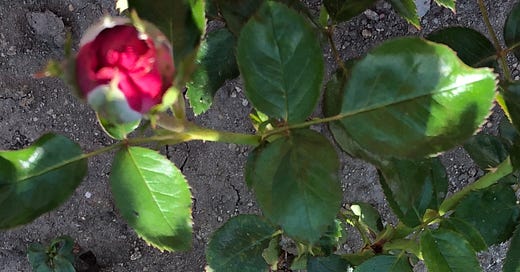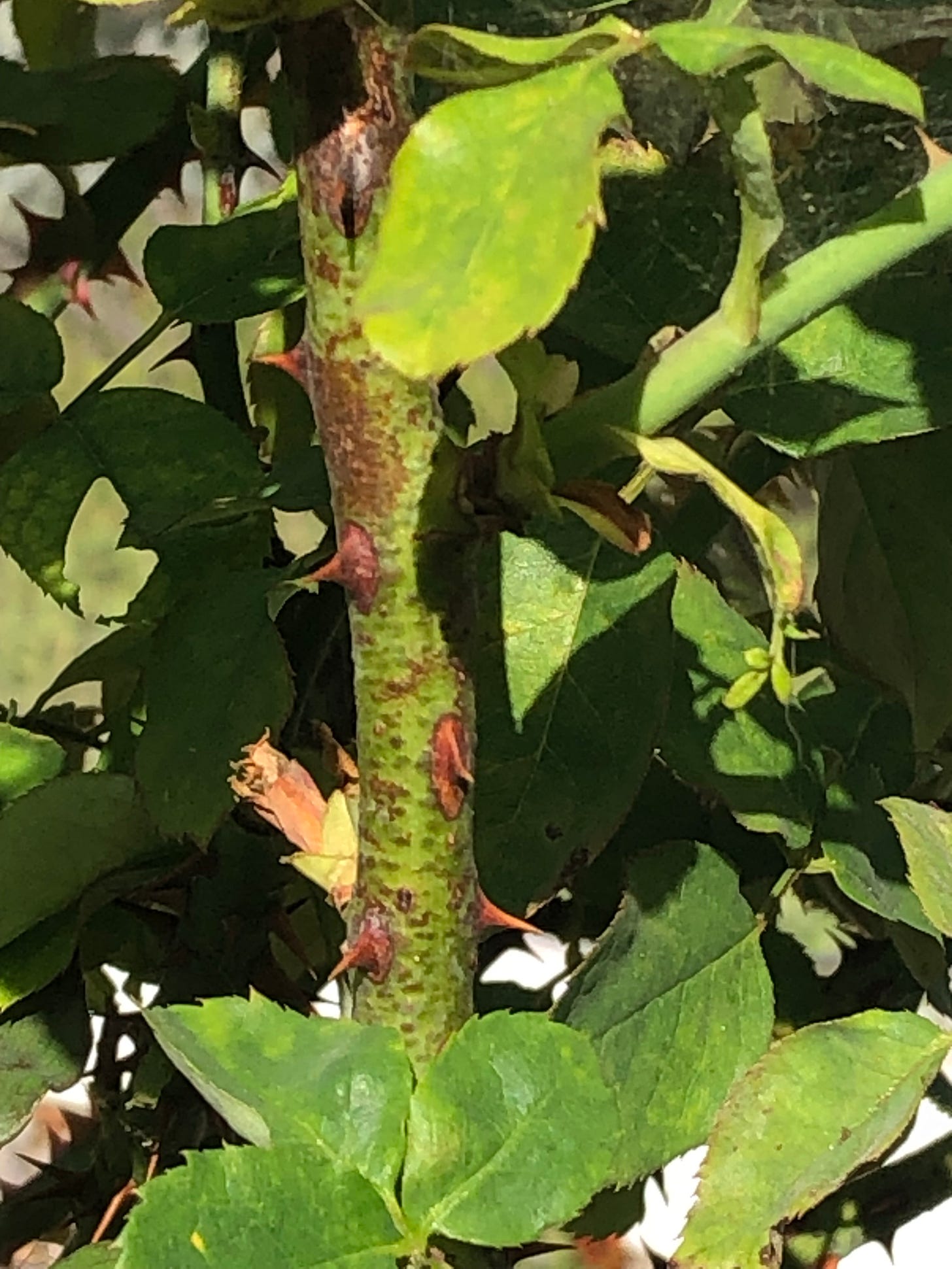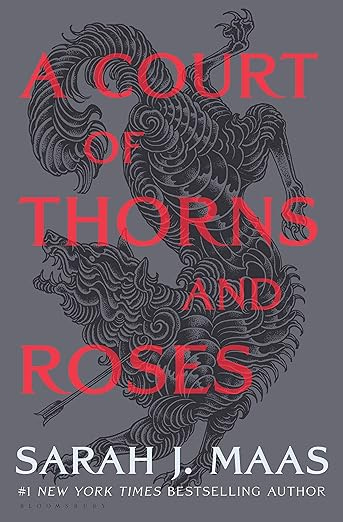Why is This Book Banned? Plus: Read Local
A look at A Court of Thorns and Roses. Reasons to enjoy being a local author.
Hello Friends,
I have two things I want to talk about today:
1) the Utah statewide school book ban of the series A Court of Thorns and Roses by Sarah J. Maas and
2) Being a local author.
These things may only be connected in my mind because they are on my radar in the same week, but I feel there’s more. I think my upcoming novel about a girl in a polygamist cult is the kind of thing that might be banned if it were from a Big Five publisher, but I am most certainly flying under the radar into the places where the book lands.
A Court of Thorns and Roses
Last week I mentioned that Utah was banning thirteen titles in schools statewide and provided a list of those titles. Six of them are from one fantasy series—Sarah J. Maas’ A Court of Thorns and Roses. I hadn’t read any of them, but, of course, I became curious. I saw quotes from reviews, some of which deemed the book “sexy.” Its target reader is thirteen years old and up.
I decided I would listen to the audiobook of the first novel in the series this week and find out what was up. I’m following with some info about it. Please understand that this isn’t a book review. It’s a sixteen-hour audiobook and, often, I was listening at double speed, not the best way to follow subplots, systems of magic, or evil faerie machinations. I just wanted to find out (within a week/in a hurry) why nearly half of the first group of books to be banned in Utah schools statewide were from this series. Add to this that I read fantasy when I want books to recommend to teens, but not often otherwise. So—I’m not always your go-to for fantasy recommendations. 1
Thorns in brief
So—A Court of Thorns and Roses is about 19-year-old human Feyre. (Her age is important—she’s an adult.) She hunts for her family, who would starve without her skills. When she kills a wolf, a beast arrives to demand retribution and takes her to faerie land. As it turns out that creature is actually Tamlin, stunningly gorgeous/ripped immortal faerie lord. The two quickly grow passionate about one another. Trouble brews and Feyre tries to sort out what the danger is. Things are magically hidden from her and, despite her being told otherwise, she learns that the fae can lie. Feyre is in constant danger and Tamlin is trying to battle epic evil in his world. The larger question is whether they and their love for one another can save them and all who depend on them in two worlds.
The novel feels like a mashup of The Hunger Games, Cinderella, and Beauty and the Beast. The reason it is banned is not because it’s pornographic. It’s because the protagonist teen is a sexual being.
Teens as sexual beings
Feyre fantasizes about Tamlin. While she hopes to keep some of these fantasies to herself, through magic, a evil faerie knows her thoughts and presents them to others: she wouldn’t mind Tamlin’s hand between her thighs; she wonders what it would feel like if he were to bite her nipple the same way he has bitten her shoulder.
There’s not a whole lot of this relative to the length of the book, but it’s there. Plus Feyre and Tamlin have sexual intercourse, which is briefly described. It’s definitely on the mature end for YA fiction. Does that mean it should be banned?
People could save a lot of time and money if they took my advice: banning books about girls wishing they had hot sex with faeries or humans is not going to stop teen girls from wanting to have hot sex. They are curious about it and reading Feyre’s fantasies probably assures teens that their own fantasies are right in there with normal behaviors.
The only thing I’d want to discuss with teens about the novel is one incident where Tamlin bites Feyre’s shoulder. It’s during a particular cultural festival where he, as faerie lord, has all his intellect stripped away and is to seek a woman to mate with. This ritual mating will replenish/make their lands fertile for the following year. Tamlin tells Feyre to hide in her room all night, but, as she never pays attention to what she is told, he catches her in the hall and bites her shoulder. She makes an escape and is later both angry and turned on. So, the attack takes place under a circumstance where Tamlin has no control over his behavior. I don’t like scenes where males have no responsibility for their sexual behavior toward women. This isn’t a reason to ban the book, but I hope the society of the novel moves forward to eliminate any thought that this is okay.
My upcoming YA novel Keep Sweet:
is about sexual abuse and violence toward girls.
I’ve mention in previous posts that books with sexual violence are now being deemed pornographic and have been removed from many school districts and public libraries.
I particularly highlighted this in the post “Whatever is Mentionable is Manageable” and I hope you’ll read that for more details.
is about spiritual abuse and questioning religious authority, another topic that upsets the book ban folks.
Allowing people to read about things like sexual and spiritual abuse doesn’t promote those things. It gives readers knowledge and helps them to talk about it.
I think like a librarian completing the collection
Early on, I had hopes that Keep Sweet would land an agent—that is, that I would land an agent. But most of the agent comments I received were that it was a bit too intense for YA. I got feedback from Carly Watters and CeCe Lyra on the podcast TSNOTYAW (
—I listen to this podcast religiously for their insights and also for Bianca Marais’ interviews with authors. If you are ready to query a novel, don’t miss it!) After reading the first five pages, Watters was curious about whether the novel was adult and asked to read it. (She doesn’t represent YA.) I sent it to her. She felt it wasn’t adult fiction. She was right. It has crossover potential, but it’s the story of a fourteen-year-old fighting the injustices of the adult world that controls her.I was able to make some changes based on Watter’s and Lyra’s advice, and I’m grateful for that advice. After that, the big question for me became whether I should eliminate the worst things that happen to the protagonist, her siblings, and friends. Ultimately I felt I shouldn’t. I’m a librarian as well as a writer, and I believe in filling holes in the collection. A persistent hole in the collection is the lack of YA books that discuss sexual-spirit abuse of underage teens and how they can escape that. With so many exvangelical memoirs being published this year, I’m sure I made the right choice. 2
Small publisher, fiction that engages with a higher truth. Fingers crossed.
Since I happen to be singing the praises of TSNOTYAW and also talking about being a local author, you might enjoy this from their newsletter this week:
Local cheese. Local pub. Local bookstore. All good things. Local author? Not so much by Nicky Greenwall
In South Africa, we have a saying, ‘local is lekker’, meaning local is good. We’ve been trying to convince ourselves of this for 30 years – and in many respects there is a lot of universal truth to the phrase, (see above references to cheese, pubs and bookstores) but there’s still a desperate edge, as though if we say it enough times – it will be so. …
That said, I was recently introduced to a woman at a party who, when she learned I would soon release a novel, said something to the effect of, ‘TBH I don’t normally read local books. I’m so sick of all our domestic problems – I’d rather be transported somewhere else.’ So, familiarity does breed contempt. This was exactly me before I found myself labelled a local writer.
After my publishing deal I spent a few mad months catching up on who was who in the local contemporary literary scene. I was almost saddened to find that there were so many books I loved. I sheepishly realized, a lot of these books I would not have considered buying – simply because I, like the woman at the party, held a private and almost unconscious aversion for anything that might be considered local. If it hadn’t instantly been picked up by an international publisher – was it worth my time? The answer I found is YES! 3
Up next
Next week: More of Utah’s thirteen banned books, many of which I’ve read and reviewed. More on being a local author and my author-panel interview at the staff training day for the Riverside Public Library.
Library and book ban/challenge news
In case you missed my post last week, here’s another article on the Utah book ban.
Utah bans 13 books at schools, including popular “A Court of Thorns and Roses” series, under new law
Some Republicans are seeking penalties and restrictions that would apply nationwide. Referring to “pornography” in the foreword to Project 2025, the Heritage Foundation’s blueprint for a possible second Donald Trump administration, the right-wing group’s president, Kevin Roberts, wrote that the “people who produce and distribute it should be imprisoned. Educators and public librarians who purvey it should be classed as registered sex offenders.”
A reminder: the leading indicator of student achievement is access to a school librarian. This has been true for a long time, shown in research over the last 20 years. People still don’t know this. Spread the word.
It’s a well-known, research-backed fact that the leading indicator of student achievement is access to a school librarian. From the Every Library Newsletter
The results of Dr. Krashen’s analysis came out abundantly clear. In all three years, poverty (socioeconomic status) was the strongest predictor of poor reading achievement. On the opposite end, school libraries were what had a consistently positive effect on reading. They found that the conclusions they came to were in line with those of other studies like Keith Curry Lance’s school library impact studies which showed that the quality of a school library was a clear indicator of reading achievement.
Iowa Law Requiring Schools to Remove Books With Sexual Content to Take Effect
A federal appeals court lifted an injunction on the law, which had already led to the removal of thousands of books from public school classrooms and libraries.
The law, known as Senate File 496, was signed by Republican Gov. Kim Reynolds in May 2023, and bans any titles that describe sexual acts from K-12 schools, with the exception of religious texts. The law also limits instruction about sexual orientation and gender identity before seventh grade, which has led some schools to remove books that address those issues.
After the law was passed, thousands of books were banned from schools around the state, according to The Des Moines Register. Titles that have been removed include classics and popular fiction like “The Color Purple,” by Alice Walker, “Looking for Alaska,” by John Green, and “The Handmaid’s Tale,” by Margaret Atwood.
Who’s grooming who? School board candidates fight ‘agenda’ of inclusivity from the Las Vegas Sun
This is about a Las Vegas, Nevada local school board race, but I think it’s worth reading to see the language book ban folks use to describe people who disagree with them (their ‘enemies.’)
As LGBTQ library material comes under fire, California may ban book bans from Cal Matters
Fresno County is about to appoint a library review committee that critics say will censor children’s books. But a bill before the Legislature would outlaw such groups in California.
Interesting article on the issue at the Clovis Branch. Includes a few reasonable people using ‘broadening the collection’ as a solution (add more of what they don’t have rather than take away what they do).
High School Students Explain Why We Can’t Let Classroom Censorship Win from the ACLU
We spoke to students about why book bans and efforts to restrict instruction on diverse topics, like racism or sexism, only make learning harder.
Brief quotes from eight students.
I have read and enjoyed some fantasy. I needed to dip into the popular genre as a school librarian. Leigh Bardugo’s Ninth House and Hell Bent as well as Shadow and Bone; Daughter of Smoke and Bone by Laini Taylor; Beautiful Creatures by Kami Garcia and Margaret Stohl; A Long, Long Sleep by Anna Sheehan; Wither by Lauren DeStefano; Graceling by Kristin Cashore; a lot of the Ranger’s Apprentice series and many more (search ‘fantasy’ on School Library Lady and all the titles/reviews will pop up).
I’ve loved, loved one fantasy: The Buried Giant by Kazuo Ishiguro
I don’t want to get you the idea that I’m totally unfamiliar with fantasy. But I have a hard time with it when it’s too long, too repetitive. It reminds me of being told a story by Uncle Colm in Derry Girls.
On her Substack,
is serializing an exvangelical memoir. (https://open.substack.com/pub/constanceford?r=1aqr9&utm_medium=ios) It’s compelling and you can subscribe for free. Here, I reviewed an exvangelical memoir that launched this week, A Well-trained Wife.






I'm looking forward to your book, Victoria! And thanks for the mention! Substack refuses so far to fix my account (not sure what to do about it!) but the only way for people to find my memoir posts is by searching for the title, "State of Wonder." If you click on my name only it shows l haven't posted anything! Frustrating! But thanks again for another useful and valuable post!
Although not YA, the memoir Uncultured by Daniella Mestyanek Young details rampant sexual abuse in a cult and her journey to break free from imposed ideology as well as physical isolation.